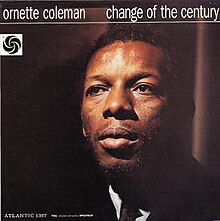
Randolph Denard Ornette Coleman was an American jazz saxophonist, trumpeter, violinist, and composer. He is best known as a principal founder of the free jazz genre, a term derived from his 1960 album Free Jazz: A Collective Improvisation. His pioneering works often abandoned the harmony-based composition, tonality, chord changes, and fixed rhythm found in earlier jazz idioms. Instead, Coleman emphasized an experimental approach to improvisation rooted in ensemble playing and blues phrasing. Thom Jurek of AllMusic called him "one of the most beloved and polarizing figures in jazz history," noting that while "now celebrated as a fearless innovator and a genius, he was initially regarded by peers and critics as rebellious, disruptive, and even a fraud."

The Shape of Jazz to Come is the third album by the jazz musician Ornette Coleman. Released on Atlantic Records in 1959, it was his debut on the label and his first album featuring the working quartet including himself, trumpeter Don Cherry, bassist Charlie Haden, and drummer Billy Higgins. The recording session for the album took place on May 22, 1959, at Radio Recorders in Hollywood, California. Although Coleman initially wished for the album to be titled Focus on Sanity after the LP's fourth track, Atlantic producer Nesuhi Ertegun suggested the final title, feeling that it would give consumers "an idea about the uniqueness of the LP."
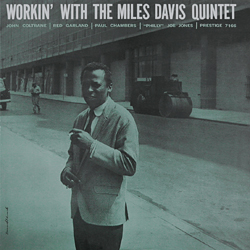
Workin' with the Miles Davis Quintet is an album by the Miles Davis Quintet which was released c. January 1960 through Prestige Records. It was recorded in two sessions on May 11 and October 26, 1956, that produced four albums: this one, Relaxin' with the Miles Davis Quintet, Steamin' with the Miles Davis Quintet and Cookin' with the Miles Davis Quintet.

Monk's Music is a jazz album by the Thelonious Monk Septet, which for this recording included Coleman Hawkins and John Coltrane. It was released in November 1957 through Riverside Records. The recording was made in New York City on June 26, 1957.

In All Languages is a 1987 double album by Ornette Coleman. Coleman and the other members of his 1950s quartet, trumpeter Don Cherry, bassist Charlie Haden, and drummer Billy Higgins, performed on one of the two records, while his electrified ensemble, Prime Time, performed on the other. Many of the songs on In All Languages had two renditions, one by each group.

This Is Our Music is the fifth studio album by American jazz saxophonist Ornette Coleman, recorded in July and August of 1960 and released on Atlantic Records in March 1961. It was Coleman's first album with drummer Ed Blackwell, and his only album on Atlantic to include a standard, in this case a version of "Embraceable You" by George and Ira Gershwin.

Free Jazz: A Collective Improvisation is an album by the jazz saxophonist and composer Ornette Coleman. It was released through Atlantic Records in September 1961: the fourth of Coleman's six albums for the label. Its title is named the then-nascent free jazz movement. The recording session took place on December 21, 1960, at A&R Studios in New York City. The sole outtake from the album session, "First Take," was later released on the 1971 compilation Twins and subsequent CD reissues of Free Jazz.

Eric Dolphy at the Five Spot is a pair of live albums by the jazz musician and composer Eric Dolphy. They were released in December 1961 and November 1963 through Prestige Records. They were recorded on the night of 16 July 1961 at the end of Dolphy's two-week residency, alongside trumpeter Booker Little, at the Five Spot jazz club in New York. It was the only night to be recorded. The engineer was Rudy Van Gelder.
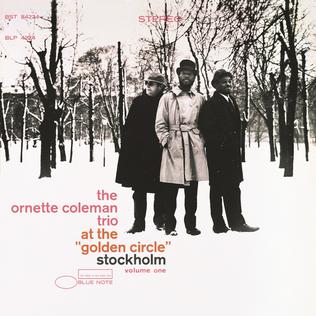
At the "Golden Circle" Stockholm is a pair of 1966 live albums by the Ornette Coleman Trio, documenting concerts on the nights of December 3 and 4, 1965, at the Gyllene Cirkeln club in Stockholm.

Something Else!!!! is the debut album by jazz saxophonist Ornette Coleman. It was released by Contemporary Records in September 1958. According to AllMusic, the album "shook up the jazz world", revitalizing the union of blues and jazz and restoring "blues to their 'classic' beginnings in African music". It is unusual in Coleman's output in that it features a conventional bebop quintet instrumentation ; after this album, Coleman would omit the piano, creating a starker and more fluid sound.

Cool Struttin' is a studio album by the jazz pianist and composer Sonny Clark. It was released through Blue Note Records in August 1958. The recording was made on January 5, 1958 with a group for the session consisting of horn section Art Farmer and Jackie McLean, and Miles Davis Quintet rhythm section Philly Joe Jones and Paul Chambers.

Twins is an album credited to jazz composer and saxophonist Ornette Coleman, released by Atlantic Records in 1971. The album was assembled without Coleman's input, comprising outtakes from recording sessions of 1959 to 1961 for The Shape of Jazz to Come, This Is Our Music, Free Jazz: A Collective Improvisation, and Ornette! Sessions for "Monk and the Nun" took place at Radio Recorders in Hollywood, California; for "First Take" at A&R Studios in New York City, and all others at Atlantic Studios also in Manhattan. The track "First Take" was a first attempt at "Free Jazz" from the album of the same name.
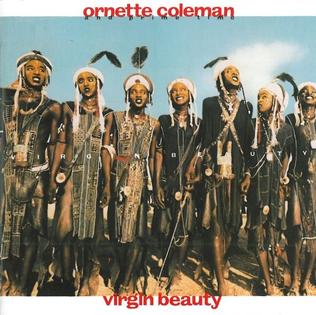
Virgin Beauty is an album by Ornette Coleman and his Prime Time ensemble. It was released by Portrait Records in 1988.

Ornette! is a studio album by the alto saxophonist and composer Ornette Coleman. It was released in February 1962 through Atlantic Records. The album features Scott LaFaro in place of Charlie Haden, who had left the Quartet but would work again with Coleman in the future.

Pre-Bird is an album by jazz bassist and composer Charles Mingus consisting of music that was composed before Mingus first heard Charlie Parker, hence the title Pre-Bird. It was released on Mercury Records in September 1961.

The Art of the Improvisers is an album credited to jazz composer and saxophonist Ornette Coleman, released by Atlantic Records in 1970. The album was assembled without Coleman's input, comprising outtakes from recording sessions of 1959 to 1961 for The Shape of Jazz to Come, Change of the Century, This Is Our Music, Ornette!, and Ornette on Tenor. Recording sessions in 1959 took place at Radio Recorders in Hollywood, California; those in 1960 and 1961 at Atlantic Studios in New York City.

To Whom Who Keeps a Record is an album credited to jazz composer and saxophonist Ornette Coleman, originally released by the Japanese subsidiary Warner Pioneer of Warner Bros. Records in 1975. The album, which was assembled by Atlantic producer İlhan Mimaroğlu without Coleman's input, comprises outtakes from Atlantic Records recording sessions of 1959 and 1960 for Change of the Century and This Is Our Music. Sessions for "Music Always" took place at Radio Recorders in Hollywood, California with Billy Higgins on drums; all others took place at Atlantic Studios in New York City with drummer Ed Blackwell.

Science Fiction is an album by the American avant-garde jazz saxophonist and composer Ornette Coleman, recorded in September and October of 1971 and released on Columbia Records in February 1972.
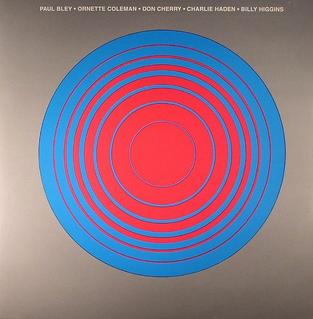
Live at the Hilcrest Club 1958 is a live album by pianist Paul Bley, saxophonist Ornette Coleman, trumpeter Don Cherry, drummer Billy Higgins and bassist Charlie Haden recorded in California in 1958 and released on the Inner City label in 1976. The album was the first live recording of Ornette Coleman, made shortly after he recorded his first album, Something Else!!!! and featuring the group that would soon record the Atlantic albums The Shape of Jazz to Come (1959) and Change of the Century (1960).

Coleman Classics Volume 1 is a live album by pianist Paul Bley, saxophonist Ornette Coleman, trumpeter Don Cherry, drummer Billy Higgins and bassist Charlie Haden recorded in California in 1958 and released Bley's on the Improvising Artists label in 1977. The album is an early live recording of Ornette Coleman, made shortly after his first album, Something Else!!!! and featuring the group that would soon record the Atlantic albums The Shape of Jazz to Come (1959) and Change of the Century (1960).
